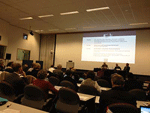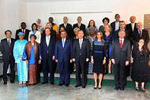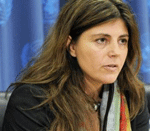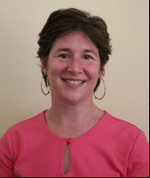Social Watch News
Published on Wed, 2013-05-15 00:00
Robert McNamara was Defense Secretary of the US when President Lyndon B. Johnson started the "War on Poverty". Inspired by this experience, as president of the World Bank, McNamara began in 1973, a global fight against absolute poverty, which he promised to eradicate "by the end of this century." Years later, Republican President Ronald Reagan mocked his Democratic predecessor saying that "LBJ declared war on poverty ... and lost ". The same can be said of McNamara. Forty years after this global war started, the World Bank now marks 2030 as the date for completion. To avoid the embarrassment of another defeat, on top of decades of delay, the Bank seems to be lowering the bar that measures progress. McNamara drew the line of absolute poverty at 30 cents, or its equivalent in purchasing power of each national currency. |
Published on Tue, 2013-05-14 17:18
The main problem with the MDGs, globally, is that the overall approach towards development they represent is quite narrow, limiting countries’ incentives to institute structural changes that would foster development. This is particularly evident in the case of Goal 2: ‘Achieve Universal Primary Education,’ which excludes economically active people in developing countries who are in need of further education, re-skilling or vocational training. Using the case of Cyprus, we can examine how the Lifelong Learning strategy it adopted made the link between LLL and sustainable development, and ask whether the Cyprus model provides a potential model for developing countries in the post-MDG agenda. |
Published on Tue, 2013-05-14 00:00
A group of Southern NGOs, led by DAWN, ANND and Social Watch, is gathering signatures in order to send this letter in the coming days to the members of the High Level Panel that is advising the UN on the content of a future Agenda for Development post-2015. To add your signature to the letter please write to socwatch@socialwatch.org. |
Published on Mon, 2013-05-13 12:16
Here is the map of the complicated road towards a development agenda post 2015. Check out this visual from The Broker that shows which actors play a role in the Post-2015 process and provides links for further information. |
| Published on Thu, 2013-05-09 20:39 |
Published on Tue, 2013-05-07 12:55
In a highly publicized speech, World Bank President Jim Yong Kim announced in April that the new "highly ambitious" target of his institution will be "ending extreme poverty in the world by 2030." He said that developing countries have “a chance -- for the first time ever -- to end extreme poverty within a generation." Yet, that same goal was set 40 years ago by then World Bank president Robert McNamara and the target date was the year 2000. What's the excuse for a delay of 30 years? |
Published on Tue, 2013-05-07 12:55
Interview with Magdalena Sepúlveda, Special UN Rapporteur for Human Rights and Extreme Poverty What are the Guiding Principles on Extreme Poverty and Human Rights? They are a set of human rights norms recently adopted by the UN Human Rights Council. They provide, for the first time, global policy guidelines validating specific obligations incumbent on States with respect to persons living in extreme poverty. |
| Published on Fri, 2013-05-03 08:51 |
Published on Thu, 2013-05-02 10:55
Unlike many developing countries, India’s economy has been growing at a fast pace, enabling the government to mobilize the necessary resources internally for the achievement of the Millennium Development Goals (MDGs) by 2015. Its dependence on international aid, especially for financial resources is minimal; in fact it has declined bilateral aid from many countries. Despite this, however, the country has failed to achieve most of the goals and targets. The main reasons for this are inadequate funding, inappropriate administration and ignorance of policy and governance issues. Ultimately however, the failure is due to the absence of inclusiveness in the development model. Instead of enabling people to acquire basic needs such as food, sanitation, water, health care, the government is promoting ‘non-inclusive growth’ and has sought to provide basic services through subsidies with the associated problems of inefficiency and corruption. |
Published on Thu, 2013-05-02 10:06
This publication analyses the role gender equality plays in the post-Rio+20 process for a new development agenda centered around a set of SDGs. It looks at proposals and efforts to integrate gender equality and women's rights into efforts to define the SDGs and argues that a new global women's coalition of committed advocates and women's rights activists to focus more aggressively on governance and policy reform in the post-2015 development agenda, particularly on macro-economic policy reform. |
SUSCRIBE TO OUR NEWSLETTER










